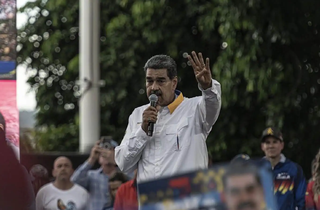Maduro claimed that these platforms were "spreading hatred aimed at dividing the Venezuelan people, inciting massacre and division in Venezuela, and spreading fascism in Venezuela," describing these actions as part of a "criminal coup d'etat."
During a visit to Venezuela's national military headquarters, Maduro addressed top army personnel, asserting that the country's opponents were attempting to undermine the military from within by sowing division, demoralization, and destabilization. He specifically mentioned a "cyberbullying campaign" on WhatsApp involving calls and messages designed to destabilize the nation.
Maduro expressed gratitude to the Venezuelan National Guard for maintaining calm and upholding constitutional rights during the disturbances. He emphasized that the military would never "obey the orders of the blue blood oligarchy or the North American empire."
The National Electoral Council declared Maduro the victor of the presidential election on July 28. However, his victory triggered nationwide riots and violence, driven by opposition claims of electoral fraud and widespread skepticism over the results. This situation has been dubbed a "Guaido 2.0" scenario, in reference to previous election controversies involving opposition leader Juan Guaido.
In response to the election results, the United States swiftly rejected Maduro's victory and urged the international community to recognize Venezuelan opposition leader Edmundo Gonzalez as the legitimate president, echoing past actions taken during previous Venezuelan elections.
Maduro has also stated that global Zionism is behind the coup attempt in Venezuela. In an interview with Al Mayadeen on August 3, he accused Zionist influence in the media and social media of supporting and funding the far-right opposition in Venezuela.
Maduro declared his election victory as a testament to the Venezuelan people's fight for independence, dignity, and future. He reiterated Venezuela's support for Palestine and condemned what he described as "the worst genocide since Hitler" against the people of Gaza and Palestine. He affirmed Caracas' commitment to "Arab and Muslim causes," expressing optimism that these causes would ultimately triumph.
Additionally, Maduro confirmed that Venezuela had been invited to the upcoming BRICS summit in Kazan, Russia, scheduled for October. Venezuelan Foreign Minister Yvan Gil announced the invitation, highlighting international support for Maduro amidst a fierce US-backed campaign that claims the election was fraudulent and that opposition candidate Edmundo Gonzalez was the rightful winner. (ILKHA)



 Dünya
Dünya
 Dünya
Dünya
 Dünya
Dünya
 Güncel
Güncel
 Güncel
Güncel
 Dünya
Dünya
 Güncel
Güncel
 Güncel
Güncel
 Güncel
Güncel
 Güncel
Güncel





